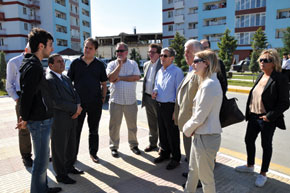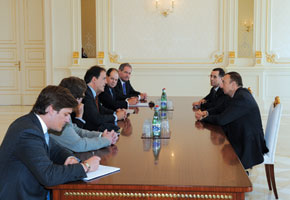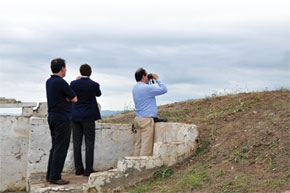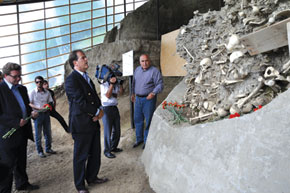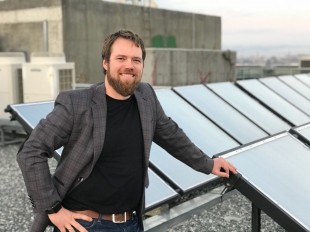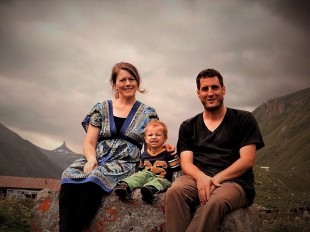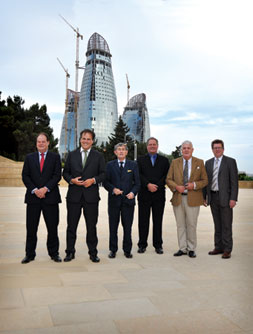 Pages 14-18
Pages 14-18Four MPs and two members of the House of Lords were in Azerbaijan during the last week of May for a busy schedule of high-level meetings and visits to the regions, arranged with The European Azerbaijan Society. The six are all members of the Azerbaijan All-Party Parliamentary Group (AAPG): the mission was led by Group Chair Mark Field and included the Lords Kilclooney and Rogan and MPs Bob Blackman, Stephen Hammond and Gerry Sutcliffe.
Day one was one of political perspective; the group met first with President Ilham Aliyev and later with Deputy Prime Minister Ali Hasanov, Chairman of the State Committee on IDP and Refugee issues, and Millis Majlis Speaker Oqtay Asadov. There was also a meeting with British Ambassador Carolyn Browne and a dinner hosted by the Azerbaijan-UK Parliamentary Friendship Group.
The second day combined history, business and culture, beginning with a visit to Shahidlar Khiyabani, the burial place for victims of Soviet oppression on 20 January 1990 and the Armenian occupation of Nagorno-Karabakh. There is also a memorial to British soldiers killed in Azerbaijan during World War I. Azerbaijan is best known in the west for its mineral wealth and a visit to Sangachal Terminal, where Caspian oil comes ashore, gave some idea of the scale of the operation. Meetings with Minister of Culture and Tourism Abulfaz Qarayev and Deputy Foreign Minister Mahmud Mammadguliyev, engendered ideas about the possibilities for further business and political cooperation between the countries and the day ended at an official reception by the President of Azerbaijan to celebrate the country’s Republic Day (28 May 1918 saw the founding of the first independent state of Azerbaijan).
‘Internally displaced’
Visions of Azerbaijan joined the group for days three and four of their visit and we set off for a closer look at the major problem facing the country – the occupation of Nagorno-Karabakh. Firstly, a visit to IDP (Internally Displaced People – ie refugees within their own country) settlements in Baku brought home the cost to both individual and nation. An old block of apartments, diverted from use as student accommodation, is still home to families of IDPs and conditions are far from ideal; however, new apartments are being built and conditions improved; 2,000 of Baku’s 14,000 IDPs are now in new accommodation. Lord Kilclooney, a seasoned visitor to Azerbaijan, recalled earlier trips:
When I came here 12 years ago the refugees were in miserable conditions: sewage in the streets. It’s good to see a big improvement now.
From Baku, the party flew west - closer to the source of the problem - to Afatli village in the Aghdam region, close to the ceasefire frontline. Nizami Sadikhov, head of the Aghdam region Executive Authority, described the problems faced by those who had been forced out of their homes in Aghdam city and other occupied areas. Answering a question from Mark Field, he explained that the fact that water sources were under Armenian control, so that supplies were stopped in the summer and lands flooded in winter, had a disastrous effect on agriculture. Aghdam city, he said, used to be European style and the area one of the most beautiful, but now the city lay in occupied land and was reduced to ruins, ‘the Hiroshima of the Caucasus’.
And, of course, the ceasefire is conditional. It was only in March, in the nearby village of Orta Gervend, that 9 year old Farid Badalov had paid the price for playing outside his home; shot through the head, he became the latest victim of a not-so frozen conflict.
Explaining the inexplicable
Gerry Sutcliffe asked about the Executi ve’s responsibiliti es when the ceasefire was broken; Mr Sadikhov said that they tried to explain the situati on to an increasingly impatient population – and they organised the funerals, which sometimes had to be at night for safety reasons. He added that 20,000 people had actually returned to live in the frontline region, risking death rather than living with the uncertainty and waiting for a return to their native land:
Perhaps the international community thinks that with the delay of a settlement people will forget. Well here people are even writing wills, asking to be reburied in Nagorno-Karabakh after liberation.
Like others met by the delegation, Mr Sadikhov pointed to the speed with which the UN resolution on Libya was enacted – within hours – in contrast to the 20 years that have passed since four UN resolutions called for the withdrawal of Armenian forces from Nagorno-Karabakh, which would mean the restoration of rights denied to up to one million displaced people.
Moving on to the village of Afatli, the delegation was welcomed in song by children from the village’s music school, and then villagers described their lives:
Our houses were burned down, even our graves were destroyed….a soldier was shot and killed a week ago, we can’t go to work the land for fear of the shooting…. how long will it go on?... We plead for a peaceful solution… please take our message to international organisations.
The delegation visited new IDP accommodation, built by presidential order and opened in November 2010 for 689 families, with a kindergarten, school, medical and culture centres. The final visit of the day provided a stark contrast to the pristine condition of the new housing. Driving past Farid Badalov’s house, the MPs arrived at a frontline post, 2 kilometres or so from an Armenian army position. Through binoculars we saw the city of Aghdam, now out of reach for its former inhabitants, some 20 years after they were given the option ‘leave or die.’
Coexistence, carpets...
History, business and culture all featured on day four with a visit to Quba in the north. The city’s Olympic Centre was first stop, for a welcome and introduction to the city, over tea and sweets, by Nasrulla Veliyev, Deputy Head of the Executive Authority. With a glance at the impressive, Olympic-standard pool, we were then on our way to Qirmizi Qesebe (Red District), to be greeted by leaders of the 3,500 Mountain Jews who live there. They told us that the settlement was founded in the 1730s, but that Jews have lived in the South Caucasus for 1500 years. There were once 13 synagogues in the district, but the Soviet era intervened – there are now two in use. As religion is separate from the state in Azerbaijan, the first synagogue, built in 1899, was maintained by the community, but the schools were state-funded. The second synagogue was constructed between 1995 and 2000. In Soviet times, they said, the use of synagogues was forbidden, but Jews who practised their faith had never been betrayed by their Azerbaijani (Muslim) neighbours
We have never faced discrimination in Azerbaijan – neither religious nor nationalist
Community leaders were anxious to assure us that friendly relations were the norm at all levels of society. Qirmizi Qesebe was always on the presidential itinerary for visits to the city,
You see how happy and friendly life is here….and we oft en receive guest visitors from other countries.
Mark Field replied on behalf of an impressed delegation:
Thank you for allowing us this ti me in the solemn home of the Mountain Jews in Azerbaijan. The last 280 years have seen tumultuous ti mes in the world, but it is a great joy to hear that you have lived in such good relations with Azerbaijanis in this beautiful part of the world. You can be an example to other communities in conflict and we will take back beauti ful memories of our visit.
Quba, along with Qazakh and Karabakh, is well-known in the world of textiles for its ancient tradition of carpet-making, and a visit to the Qadim factory was tempting enough to persuade at least one member of the party to take home one of its colourful products. It is a very labour-intensive business, traditionally done by women weavers, still, sometimes at home, and the skill is passed on within families.
...and cataclysm
The final engagement in Quba was much less pleasant. In 2007 archaeologists unearthed the bones of hundreds of people whose bodies had apparently been dumped in former wells and ditches. Qahraman Agayev, Senior Researcher at the Institute of Archaology and Ethnography, National Academy of Sciences, explained the significance of the find. Research, he said, had led back to an event in May 1918, troubled times in Azerbaijan when Stepan Shaumian, Bolshevik leader of the Baku Commune, sent a punishment troop of Russians and Armenians against Azerbaijanis resisting the Commune. The result was nine days of torture and massacre.
No cloth was found with the bones; the injuries had been inflicted by tools, axes, knives - not by bullets - nails had been driven into skulls…in one ditch there were 211 skulls. During the research there were claims that the bones belonged to Armenians, but this was highly unlikely as, according to records, there were only 17 Armenian families in Quba at the time. Two months earlier, thousands of Azerbaijanis had been massacred in Baku in what Shaumian himself described was
to some extent, the character of an ethnic massacre….The Muslim poor suffered severely…
Part of the site had been left for independent research by international experts, but the part displayed, preserved as a memorial and museum, is certainly a chilling vision. As Lord Rogan commented about the two days:
It was worth it; only by seeing it can you appreciate what’s going on.
Reflections
From the top of Baku’s TV tower, the delegation finally relaxed with a superb view of the capital. They also looked back over their four day visit. Lord Kilclooney, who has been to Azerbaijan many times in the past, noted the huge changes taking place:
The biggest change is in the rapid development of roads, buildings and office blocks. The city’s rate of expansion is incredible. My colleagues are quite taken aback. It’s a real European city. I’m glad I was a member of the campaign to get Azerbaijan into membership of the Council of Europe.
I first met refugees in the late 1990s when I went towards Nagorno-Karabakh, monitoring elections. They were in dreadful conditions….The nice new houses are a wonderful improvement. I despair of the lack of progress on Nagorno-Karabakh through the Minsk Group. I hope the UK and Germany will lead in getting the four UN resolutions implemented.
….I hope to return next year with my daughters for the Eurovision competition!
For MP Bob Blackman this had been his first visit to Azerbaijan and he had much to reflect on at the end of a very full itinerary.
I had read about the government and oil and gas, but I didn’t really appreciate the history. There’s a lot more to come out of a country now freed from the Soviet yoke – many things have been hidden from the world: the massacre site we saw today…
A thing that surprised me was the large Jewish community and the tolerance towards other religions – this was a refreshing change…. people were very friendly, relaxed and willing to talk. The food is magnificent and plentiful, the hospitality is amazing. The opportunities from oil and gas are enormous…the potential gas supplies could be double Europe’s requirements….provided they plan how to switch to a mixed economy when the world moves away from an oil and gas-based economy… and I can see the possibilities for tourism and the general economy. I was impressed with the sports facilities – the UK could learn something here…
The West needs to wake up rapidly to the possibilities of this gateway between Russia and Iran. We should encourage cultural, tourism and economic links – we’re not out to colonise but to cooperate, in the way the UK created a Commonwealth out of Empire – independence and cooperation, not hostility.
I can understand the frustration seeing the UN act next day on a resolution about Libya while nothing has happened about the four resolutions on occupied Azerbaijan. I believe it’s a forgotten issue… We must try and move it up the agenda.
As for a future trip:
I’d like to see more of the Old Town and meet more ordinary people; see how ordinary people live…
During the trip Mark Field, Chair of the AAPG, remarked how touched members of the delegation had been by the generosity shown in Azerbaijan and how the visit had helped them to understand and acknowledge the frustrations felt by the IDPs. He noted the impressive progress made by Azerbaijan and thought that if Armenia wanted to be part of this progress, it had to come to a resolution of the problem. Noting that his mother, from Central Europe, had twice been a refugee he understood the passion for justice and peace. Urging people to look to the future in a country being transformed, he promised that the delegation would report what they had seen to the UK Parliament and wished IDPs well in their campaign.
